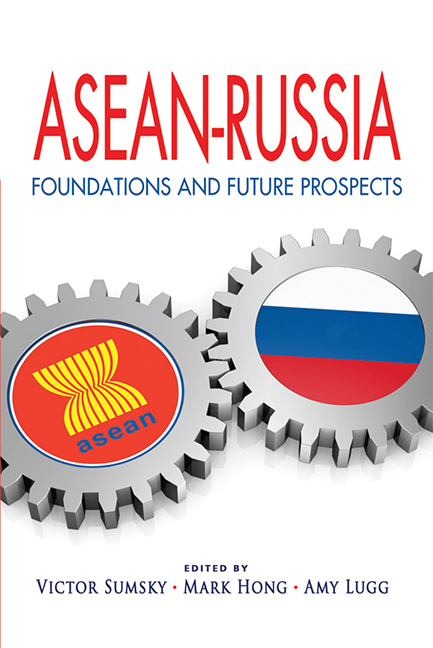Book contents
- Frontmatter
- Contents
- Foreword
- Preface
- About the Contributors
- Keynote Address
- Opening Remarks
- Keynote Address
- Introduction: Russia and the ASEAN Member States: Political and Economic Cooperation in Progress
- SECTION I WISEMEN'S VIEWS
- SECTION II GEOPOLITICS
- SECTION III BILATERAL RELATIONS
- What Singapore May Offer to Russia? The Present State and the Prospects of Relations
- Myanmar-Russia Relations in a Changing World: Growing Ties based on Strategic Partnership and Economic Prospects
- Russian-Myanmar Relations
- Russia-Thailand Relations: Historical Background and Contemporary Developments
- Russia and Vietnam: Building a Strategic Partnership
- Malaysia-Russia Relations: Revving up a Distant Relationship
- Cambodia and the USSR/Russia: Fifty-five Years of Relations
- SECTION IV Business and Economics
- SECTION V CULTURE AND EDUCATION
- EPILOGUE
- Index
Russia-Thailand Relations: Historical Background and Contemporary Developments
from SECTION III - BILATERAL RELATIONS
Published online by Cambridge University Press: 21 October 2015
- Frontmatter
- Contents
- Foreword
- Preface
- About the Contributors
- Keynote Address
- Opening Remarks
- Keynote Address
- Introduction: Russia and the ASEAN Member States: Political and Economic Cooperation in Progress
- SECTION I WISEMEN'S VIEWS
- SECTION II GEOPOLITICS
- SECTION III BILATERAL RELATIONS
- What Singapore May Offer to Russia? The Present State and the Prospects of Relations
- Myanmar-Russia Relations in a Changing World: Growing Ties based on Strategic Partnership and Economic Prospects
- Russian-Myanmar Relations
- Russia-Thailand Relations: Historical Background and Contemporary Developments
- Russia and Vietnam: Building a Strategic Partnership
- Malaysia-Russia Relations: Revving up a Distant Relationship
- Cambodia and the USSR/Russia: Fifty-five Years of Relations
- SECTION IV Business and Economics
- SECTION V CULTURE AND EDUCATION
- EPILOGUE
- Index
Summary
One can generally say that Russia and Thailand have friendly relations based on mutual respect. Despite the geographical remoteness, both states have a long tradition of interaction. It is a well known fact that amicable relations between Emperor Nicholas II and King Chulalongkorn (Rama V) helped Siam to avoid colonial dependence and maintain a balance between the great powers of that time.
The current development of bilateral relations is marked by positive dynamics in the political sphere, especially from the year 2000 when mutual political contacts were intensified. In the year 2003, President Vladimir Putin became the first Russian leader to visit Thailand for more than a hundred years. In July 2007, Her Majesty Queen Sirikit paid a visit to Russia to commemorate the 110th anniversary of Russia-Thailand relations. However, the relationship is not without challenges. Economic ties have not yet reached their highest possible level and political ties have been, to a certain extent, affected by the several changes in government in Thailand in recent years. Factors that would enhance the relationship include the creation of better conditions and mechanisms for greater understanding and knowledge of each other. Human resources development in this respect is a key issue.
A HISTORICAL OVERVIEW
The temperature of relations between Russia and Thailand throughout its history has alternated between hot, cold, and lukewarm. From the warm and close relations between the two monarchies during the late nineteenth century to the icy breeze of ideological antagonism during the Cold War, Russia-Thailand relations in the post-Cold War world have markedly improved, with warmth and friendship gradually returning.
A Royal Friendship: The first direct contact between Russia and Siam (as Thailand was known then) took place in 1863 when two Russian warships entered the Chao Phraya River and a friendly reception was accorded by the Siamese. Compared to other Western powers which arrived in Siam much earlier, Russia's first encounter with Siam was during the modernization drives undertaken by King Rama IV and King Rama V.
- Type
- Chapter
- Information
- ASEAN-RussiaFoundations and Future Prospects, pp. 160 - 172Publisher: ISEAS–Yusof Ishak InstitutePrint publication year: 2012



